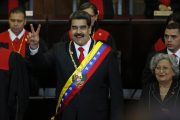
Brazil’s new Marxist president Luiz Inácio “Lula” da Silva is wasting no time strengthening economic ties with his biggest South American neighbor, Argentina. This week Brazil and Argentina will announce the creation of a common currency, which would eventually bring about the world’s second-largest currency bloc, after the Eurozone. At a conference this week in Buenos Aires, Brazil and Argentina intend to invite other South American countries to participate in the new currency, which Brazil wants to call the “sur” (“south”). The new currency would at first be issued alongside local currencies, with the goal of it eventually becoming the only currency for the four countries making up the Mercosur trade zone (Argentina, Brazil, Uruguay, and Paraguay). The initiative is regarded as timely, since both Argentina and Brazil are now controlled by leftist governments. Nevertheless, the rollout of the new currency is expected to take years, if not decades.
The context of the Argentina-Brazil talks is Tuesday’s 33-nation summit for the Community of Latin American and Caribbean States where, for the first time, Latin America’s new crop of Marxist leaders, such as Colombia’s Gustavo Petro and Chile’s Gabriel Boric, will get to rub shoulders with the likes of Venezuela’s Nicolás Maduro and Cuba’s Miguel Díaz-Canel. On the conference’s agenda, not surprisingly, are “greater regional integration” and climate change.
If this has a familiar ring, it’s because we’ve seen it all before. The European Union was built on the structure of a trade zone (the Common Market), and reinforced by the creation of a common currency. The Mercosur is of more recent vintage, having only come into being in 1991, but it is following the European playbook precisely. Like the original Common Market, Mercosur began with only a small core of full members (until 2016, Venezuela was also included). A number of other South American countries are waiting in the wings with associate status, including Chile, Ecuador, and Suriname. Like the European Community (the direct predecessor to the European Union), Mercosur already has a parliament and other organs that could eventually be vested with full state powers, when the time is deemed correct to transform Mercosur into a regional government like the EU. In the meantime, a common currency and regional issuing bank will have to be set up, and the borders of the organization expanded to bring other South American countries into full membership.
Such “free trade zones,” far from being robust exercises in capitalism, are actually pet conceits of international socialists, as evidenced by the enthusiasm for the Mercosur project among Latin American Marxists such as Lula. Although such blocs abound (the African Union and the Andean Community are two other examples), Mercosur may well be the next portion of the planet to go the way of Europe, renouncing national sovereignty in favor of socialist regional government.




